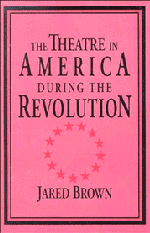Book contents
- Frontmatter
- Contents
- Preface
- Prologue
- SETTING THE STAGE: BEFORE THE REVOLUTION
- 1 The Drama of the Approaching Revolution
- 2 British Military Theatre, 1775–1777
- 3 Miscellaneous Diversions: Philadelphia, 1778
- 4 American Military Theatre and “Entertainments,” 1778
- SETTING THE STAGE: BRITAIN ASCENDANT
- SETTING THE STAGE: AMERICA ASCENDANT
- SETTING THE STAGE: AMERICA TRIUMPHANT
- Epilogue
- Appendix
- Notes
- Bibliography
- Index
3 - Miscellaneous Diversions: Philadelphia, 1778
Published online by Cambridge University Press: 29 September 2009
- Frontmatter
- Contents
- Preface
- Prologue
- SETTING THE STAGE: BEFORE THE REVOLUTION
- 1 The Drama of the Approaching Revolution
- 2 British Military Theatre, 1775–1777
- 3 Miscellaneous Diversions: Philadelphia, 1778
- 4 American Military Theatre and “Entertainments,” 1778
- SETTING THE STAGE: BRITAIN ASCENDANT
- SETTING THE STAGE: AMERICA ASCENDANT
- SETTING THE STAGE: AMERICA TRIUMPHANT
- Epilogue
- Appendix
- Notes
- Bibliography
- Index
Summary
After howe's officers concluded their theatrical adventures in New York, at the end of May 1777, Sir William was ordered to Philadelphia to mount an attack on the Americans. Howe was not to be rushed, however: He remained in New York until the last possible moment, proceeding to Philadelphia only when he could no longer delay, capturing the city in September. An angry British military command believed that Howe's procrastination cost the army valuable time and that assistance was thus prevented from reaching the embattled General Burgoyne. Howe was unrepentant.
Once in Philadelphia, the army busied itself with military duties for a time, building fortifications and opening the river for British supply ships. By December the hard work was completed and the twenty-three thousand soldiers in Howe's army settled in the city to wait as comfortably as possible for the return of warm weather. George Washington and the Continental army, camped nearby during that winter of 1777–8, endured severe hardships on the bleak hillsides of Valley Forge, in stark contrast to the dancing assemblies, cock-fighting bouts, races, and theatrical entertainments enjoyed by Howe and his troops in Philadelphia. Captain Johann Heinrichs, a Hessian mercenary with the British army, captured the spirit of that winter when he wrote in his letter-book, “Assemblies, Concerts, Comedies, Clubs and the like make us forget that there is any war, save that it is a capital joke.”
- Type
- Chapter
- Information
- The Theatre in America during the Revolution , pp. 45 - 56Publisher: Cambridge University PressPrint publication year: 1995

